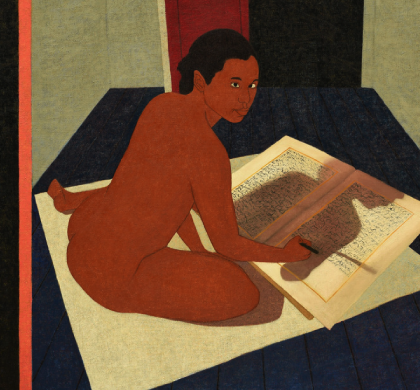
An Age of Prudence
We were asked to show them our palms, the white gold extensions of our brown arms where the playground and the innards of an infected nose were caked under cracked nails. We pawned them, our young beautiful palms, for the time it took for a cane to come whistling through the air, slashing clean the atmosphere the way an angry prophet once parted the seas. Our white gold became lined with ruby, our pain was elemental, but our contrition was deflected and would be so for the rest of our lives. We were always guilty, and so innocently unrepentant. Penitence was made the organising principle of our education.
We had penitence for breakfast where it churned in cement-mixer fashion with oatmeal till I threw it up on my blue checked pinafore and on my photo ID and on my flowery kerchief pinned to my pocket. I had it for lunch and stood still as it swelled unbearably in my bladder until I felt it warm and wet trickling down my skirt and into my socks, sloshing around in my shoes. They laughed at me and I staked the tender cartilage of my ear to the teacher all the way till the bathroom. There, I sat on a pot next to a girl whose face was red with the effort it took to force out the penitence she had for dinner last night through her bowels. I didn’t have anything left in me but I was being watched from the door, so I thought penitence was peeing righteously into the pot. The door was kept wide open so all who passed by the corridor could see the miscreants perched like twin gargoyles on powder-blue Parryware commodes.
The school ayah washed me in cold water; she pushed me around with sandpapered hands till I was wrapped in a fresh new pinafore. The school-issued substitute pinafore was a lighter shade of blue, the checks smaller and the sleeves different. Everyone knew I was guilty of something that day. I wandered bewildered and fish-eyed, went home out of habit and was fed something sour and dead at the dinner table. Ruby on my brother’s neck, ruby on his arms, ruby peeking from the hem of his shorts. Ruby on the bathroom floor, ruby under the sink, ruby bubbling with detergent and Dettol, ruby a colour, ruby a stain, ruby a shadow, ruby a name.
Ruby.
Ruby was so unavoidable.
Then, behold! Milk!
Milk is the principal tonic for the lactose-tolerant child’s growth. It is a white fluid that has marvelous powers of persuasion. The clout it wields over basic nutrition is messianic, its apostles are legion. Milk for the teeth, the aches in the legs, the complexion, the genetic deficits of height, weight and intelligence. Milk for softening food, desserts, for the curd-ghee-paneer industrial complex. Milk, an excuse for nutritional content in coffee that is the essence of coal. Milk, the substrate of civilisation. But milk went bad easily, lifted up its skirts and climbed out of the saucepan when it got too hot and mother didn’t stop talking on the phone. Milk hissed when its skirts made contact with the rim of the burner. What a mess we’ve led ourselves to.
Please, I don’t want it. Take it away.
Drinkitisgoodforyou.
Two glasses of milk, one small one bigger. Small for the small child big for the bigger child; size-adjusted proportions of goodness. My brother drinks quickly but I gag on the raw taste of milk. Suddenly, red shiny toffees land with a gentle flup, one on the floor next to me, the other on my brother’s shoulder. Ma, toffee, look. Yes, that’s from God for drinking your milk. When you don’t drink your milk He gets angry and when you drink it up He gives you a toffee. Days later, when we saw the hem of our mother’s sari disappear just as the toffees flupped on the floor, we wondered why God was absconding.
A conscience germinated, sprouted claw-like roots and I held in my breakfast for many mornings. I didn’t wear the guilty’s pinafore or pawn the white gold of my four year old palm. I drank all the milk in my glass, sported a wet, white moustache as evidence. Yet that God didn’t come again.
Maybe there are many of them.
So much since to reach an age of prudence, so much committed to thwart its coming. I now dream of milk picking up its layered skirts of froth, my mother’s messes a legacy to live with. She lends us her God to help us, but we need more. Brother pulls out a notepad and we flip to a fresh page. Across the table, I am an image who is creased at the edges. We begin to list:
A god who watches over your kindnesses and a god for all the devil’s work of your hands, a cheap god to forgive willful transgressions and a god who is a proxy for a wishing well
A god of fish-eyed bewilderment
And bad breath
A god for excuses, for the things we haven’t done. I want a god for more time
Me too
How many gods in all?
Not enough for the two of us
No?
No.
